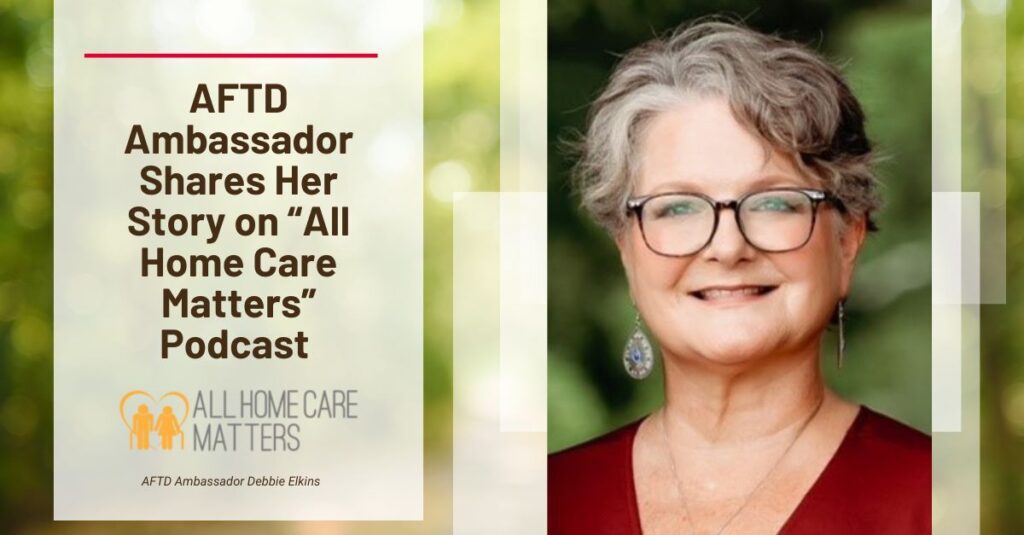Ambasadorka AFTD dzieli się swoją historią w podcaście „All Home Care Matters”

AFTD Ambassador Debbie Elkins and AFTD Support and Education Director Esther Kane, MSN, RN-CDP, appeared on the podcast All Home Care Matters in July to discuss the changed nature of relationships following an FTD diagnosis, anticipatory grief, and dementia’s social stigma.
A registered nurse, Elkins may seem as if she is better able to handle an FTD diagnosis than most people. But, as she told All Home Care Matters’ Lance A. Slatton, “I don’t think anyone is ever equipped to receive a diagnosis like FTD … to see your life shift from what you envisioned it would be.”
“It’s definitely a challenge,” she continued. “It has changed my relationship with my husband. He is still the same person I married nearly 40 years ago, but it took a while for me to recognize it. Before, we had a mutual partnership in which we both worked on our relationship, our home, and our lives, but our relationship has shifted to one where I am the care partner and caregiver.”
The hardest part for Elkins has been recognizing their relationship is no longer reciprocal, and that she has had to assume the task of managing both of their lives. “I had to realize it was OK for me to be the one in charge,” she said.
Grief
Elkins is clear about the niejednoznaczna strata she has experienced and her response to it. “I went through two or three months wondering, ‘Who is this man?’ But at some point, I got up, brushed myself off, and realized I need to educate myself,” she said. To help maintain a good attitude, Elkins has focused less on the things she and her husband cannot do, and more on recognizing what she calls “the God winks — the positive things that occur — on a daily basis.”
The Elkins’ journey to a diagnosis took six or seven years, four neurologists, and one misdiagnosis of Alzheimer’s. They discovered AFTD shortly afterward. “What I couldn’t verbalize, I was able to find it on the AFTD website,” she said. “[I found] all of this validating information and a vast wealth of support.”
She also jumped at the opportunity to become an AFTD volunteer. “I raised my hand and said, ‘Let me help get the word out,’” she said. “It has been my drive to make sure other people who are in my shoes [know about AFTD].” She again stepped up when she was asked to be an AFTD Ambassador. “I’m very passionate about getting people who think their loved one may have something besides Alzheimer’s or one of the other dementias to go to the AFTD website because there are so many educational and support resources available.”
Stigma
One of main challenges of FTD – or any type of dementia – is the stigma surrounding the disease, Elkins said. “It can be very isolating at times for those of us who are living with FTD because people may not understand. My husband does not look like he has dementia. He looks like a regular 72-year-old guy.”
Kane agreed. “We have a stigma around mental health in our country. And because of this, any cognitive change has a stigma. That is why it is important to allow people with FTD to tell their story. The more awareness we can bring, the more we can listen to people tell their stories.”
To address some of the awkwardness and confusion others might experience relating to her husband’s behaviors, Elkins has taken to carrying karty świadomości. “The card says, ‘This person has dementia,” she said. “I wanted it to have more information about FTD and AFTD, so I put a QR code on it that can take people directly to [the AFTD website].”
“We, as a society, need to learn more about dementia,” Elkins said.” We need to be more accepting. And we need to understand that while people living with a dementia diagnosis may look like they’re doing OK, life can be a struggle for us, so please — give us a little bit of grace.”
Według kategorii
Nasze biuletyny
Bądź na bieżąco
Zarejestruj się już teraz i bądź na bieżąco dzięki naszemu biuletynowi, powiadomieniom o wydarzeniach i nie tylko…
